#jjk 237
Text
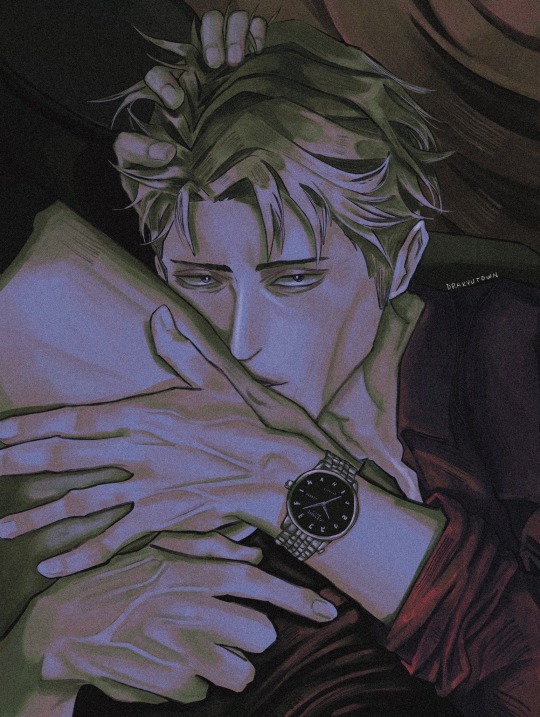
nanami's obsession
#thats my body right there#uh huh#jjk#jujutsu kaisen#fanart#digital art#jjk 237#jjk236#jjk 238#nanami#nanami kento#jjk nanami#nanami fanart#jujutsu kaisen nanami
5K notes
·
View notes
Text
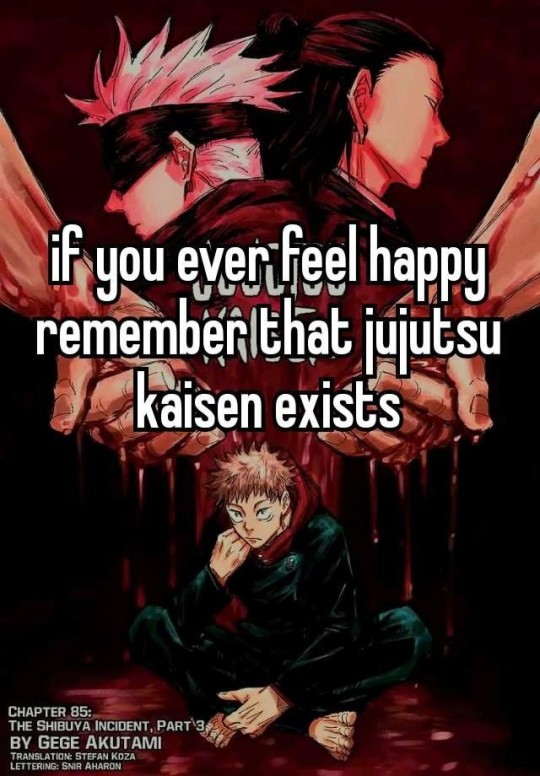
#jujutsu kaisen#jjk#gojo satoru#geto suguru#yuuji itadori#megumi fushiguro#nobara kugisaki#kento nanami#jjk spoilers#jjk manga#jjk manga spoilers#jjk 236#jjk 237#satosugu#itafushi#1k
2K notes
·
View notes
Text

but i'm still lost in the light
and i dont know what night it is
#jujutsu kaisen#jujutsu kaisen art#jujutsu kaisen fanart#jjk#jjk art#jjk fanart#fushiguro megumi#megumi fushiguro#jjk megumi#jujutsu megumi#jjk spoilers#jjk 237#sukuna#ryomen sukuna#give him back to me#gege when i catch you gege#GEGE WHEN I CATCH U#lynvole art
1K notes
·
View notes
Text
Maybe the real Jujutsu Kaisen is the collective pain and suffering we get along the way.
860 notes
·
View notes
Text
sudden sukuna characterization mid-fight, co-opting the question originally intended for gojo, who’s dead and had little to no characterization during the fight and literally no development after being unsealed, is fucking insane
513 notes
·
View notes
Text
Home, at last.
manga spoilers! chapter 237 included.
Megumi Fushiguro reunites with his family, finally.



The water that surrounded him stilled to a stop, making him float between the tides. His eyes were squeezed shut until an arm shook him whole, awaking him from a dream that felt way too long.
“Megumi,” The voice kept on calling, still shaking him, “Megumi, wake up!”
He knew who it was. That voice was Tsumiki’s. But that was impossible. He remembers. She was dead. He was the one who did it.
“Megumi,” She beamed, forcing him to open his eyes, “Megumi!”
Megumi couldn’t move. It wasn’t like before, when Sukuna trapped him inside his own body, and he couldn’t move. This time, he just didn’t want to move in fear of making it all disappear. This had to be a dream, right? If he lifted a finger, it could all dissolve into his mind. And he’d have to face reality. Wait, what reality? Where was he before? In Shinjuku, where he…
“Come on, Dad’s making pancakes!” Tsumiki slapped his arm one more time before bolting out of the room, a bounce in her steps.
Dad? Who, Toji Fushiguro? That is impossible. What kind of nightmare was this?
Megumi carefully lifted the blanket from his body, only to freeze once again. He was tiny. Incredibly, absurdly tiny. Avoiding his suspicions, he stood up and opened the door. The corridor was familiar, everything was.
And it was all confirmed to him when a voice exclaimed, “Satoru!”
Megumi froze again, dread creeping up his spine like a disease. It couldn’t be, it couldn’t possibly be.
“I got this!” Gojo assured dismissively, very much not getting it albeit his words.
He was there. Alive. Smiling and joking as always. Like nothing had changed. Megumi never felt so relieved in seeing Gojo, the same Gojo that used to annoy him endlessly, but that brought so much comfort as of now.
Beside the man, stood you. You from his memories, the one that he kept safe in his heart. Not the you from the real world. The you that he killed a few days ago.
You rolled your eyes like you always did. In a way that shows love.
“You got a burning pancake, that’s what. Even our neighbors can tell,” You smacked his hands away from the pan, handling it with caution before smoothing the surface with butter, “Set the table instead, will you?”
“You can’t kick the chef out of the kitchen! It’s like,” He bit his lip in contemplation, searching for an analogy that would leave you tongue-tied, “Kicking the musician from the stage!”
“Alright, Michael Jackson, my bad,” You laughed wholeheartedly when Gojo sticks out his tongue to you, “Go and wake up the–”
“Good morning!” Tsumiki interjected, waving her hand to you.
“Tsumiki,” You smiled immediately, you always did when you saw him or Tsumiki. For some reason, that made Megumi feel worse, “Did you sleep well?”
“Yes!” His sister sat in a stool that used to be too high for him to reach, “Megumi must’ve slept even better, I couldn’t wake him up!”
“Is that so?” You chuckled lightly, but then frowned at the silhouette standing in the corridor. Tilting your head, Megumi tensed up when your eyes focused on him, a smile adorning the corners of your lips, “Good morning, sleepyhead.”
“Megumi!” Tsumiki turned to face him, smiling too.
He walked up slowly to the counter, climbing into the stool on Tsumiki's left. Your eyes were no longer on him, which gave him time to regain his composure.
What was going on? Is this a dream, an illusion? Or is this the “life” that flashes before your eyes just before you die?
“Show off,” Someone scoffed beside him and Megumi almost forgot that Gojo was there. The man was leaning on the counter, admiring–no, scratch that, worshiping you flip the pancakes in the air.
“You’re just jealous,” You humored him, flexing your arm that held the pan as if being able to flip pancakes was a medal, “Now, which shape should I make?”
Tsumiki’s face lit up when you looked at her, awaiting her reply, “A heart!”
Megumi’s mouth moved on its own, “A dog!”
“A dog is too hard,” Tsumiki countered matter-of-factly, “A heart is simple!”
“A heart is too corny!” He argued childishly. Well, he was a child, technically.
“You’re too corny!”
A gasp ripped out of his throat, eyes bulging out of his tiny head to glare at his sister as if she had uttered the most heinous profanity at him.
Gojo laughed, his hand trying to muffle the sound, while you let out a breath that resembled a chuckle. He and Tsumiki only stopped bickering when you pushed two plates across the counter.
A heart-shaped pancake with strawberries and rose syrup drawn into a smiley face, banana slices framing the heart with raspberries in between the circles, on the rightmost plate. That one was Tsumiki’s, for sure.
And an oddly shaped pancake that, if you squint hard enough, could bear a resemblance to a canine creature–but Megumi knew what it was; three blueberries connected by thin lines of chocolate syrup, forming a triangle that was identical to the one on his Divine Dogs’ foreheads. That was his.
“Ta-dah!” And you smiled like you hadn’t made the sweetest thing for them just now.
Tsumiki’s eyes started to sparkle, “Thank you!” And she dug into her plate, munching the soft batter with an unwavering smile.
Megumi, on the other hand, wouldn’t budge.
“What’s wrong, Megs?” Gojo asked him curiously when he did nothing but stare at his plate, his lanky figure leaning on his shoulder. Fingers wiggling towards his plate, a mocking grin on his lips, “If you don’t eat, I’m sure someone–”
A spatula smacked his hand away, “Don’t pick on someone half your age, Satoru,” You chastised, but couldn't hide the endearment in your voice when you said his name, “What are you, a bully?”
Gojo held onto his hand as if a curse had just bit it off, “When did you get so violent? To get physically attacked under my own roof,” He deflated into a stool, throwing his head back while he lamented his situation, “What a cruel world!”
“Shut up and eat your pancakes,” You nagged, handing him a plate full of your failed attempts of doing Megumi’s dog-shaped ones.
“Do you even love me?” Gojo asked, utterly offended by the food that was given to him.
Megumi usually muted the squabble between the two of you in his head, unless you were insulting Gojo and needed backup (he’d gang up on him with no hesitation). But this time, he could but stare at the couple of idiots that picked up a pair of strays and raised them. Before Megumi could stop it, his eyes were pricked up with tears.
You took notice of it first, ignoring Gojo’s whining and turning to him, “What’s wrong, Gumi?”
The pure softness of your voice made him want to cry harder. He didn’t know. He didn’t know what was happening, or where he was and what it meant.
But he knew that he missed it.
The light-hearted quarrels between you and Gojo, the tranquility that mornings brought along with them, the easy-going atmosphere that always engulfed the Fushiguro-Gojo household when the four of you were together.
When did all that go away? Was it when Tsumiki got cursed? Or maybe when Gojo was sealed and everything in Shibuya turned the world upside down? Was it all gone the moment you left this world?
“Gumi,” The nickname snapped him out of it, reminding him of where he was, “Are you okay?” He was with you, with his family.
You, Tsumiki, and Gojo were staring at him worriedly. You had circled around the counter, facing and cupping his face onto your hands, holding him with so much care that he could do nothing but lean into your touch.
“I–I’m,” His mouth felt suddenly dry, no matter how much he licked his lips, “Can I hug you?”
Your eyes melted into a puddle of love and adoration, your arms wrapping around his tiny frame that trembled and quivered like a leaf in a thunderstorm.
“Shh, you’re okay,” Your quiet, sweet voice only made him sob louder, “We’re here, Gumi, you’re here.”
Megumi felt another pair of arms pressing up against him, Gojo hid his face in the crook of your neck but he somehow knew the kind of expression that the sorcerer was wearing. The kind of face that made curses and humans alike to tremble in fear. The sort of emotion that always appeared when someone dared to hurt his family.
Tsumiki nestled into your arms too, shielding her little brother from the world with her tiny arms. And you held them both in your own, with Gojo.
Megumi grabbed a chunk of your shirt, clenching his fist around the cloth. Gripping into you as if you were going to fade and slip through his fingers.
“You’re here,” You caressed his back, making little patterns with your finger. Megumi sniffled harshly, trying to just stop crying but he couldn’t. You pressed a kiss on the crown of his head, “We’re all here, sweetheart.”
Gojo ruffled his hair like he used to do when they met, and Tsumiki held his hand in the same way she did back when he was scared.
And, for a moment, Megumi forgot.
He forgot that this wasn’t real. And that Tsumiki was gone, that you were killed and Gojo defeated. He forgot that he was in Shinjuku, staring in the backseat of his own body at Hajime Kashimo, who challenged him–no, not him, Sukuna. He forgot that he had died.
But, for once in his life, he got what he wanted.
He was home. With his family.

my son :(
#megumi fushiguro#fushiguro tsumiki#jujutsu kaisen#gojo satoru#jjk 237#jjk spoilers#gojou satoru x reader#gege when i catch you gege#megumi x reader#fushiguro x reader#family love
506 notes
·
View notes
Text
DUO?!?!
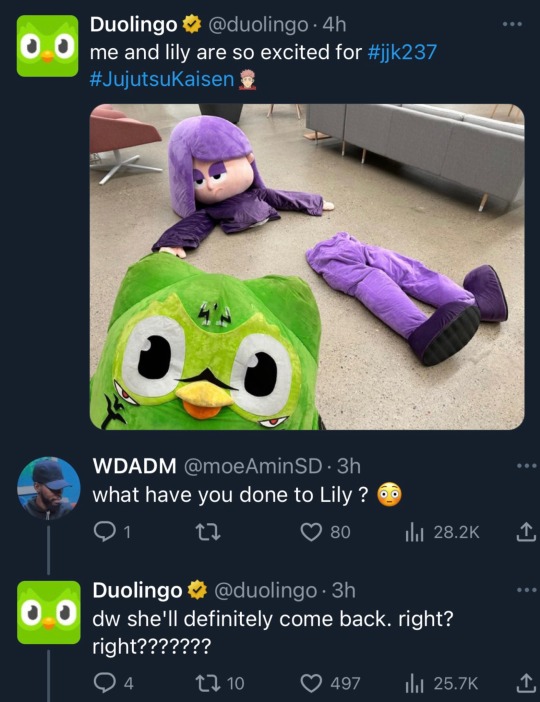
514 notes
·
View notes
Text
A little spontaneous analysis on Sukuna and his view on love and rejection that I blurted out while reading about Heian Era marriage this morning 🤓
That Sukuna panel came to mind with him saying, he’s “a cursed, unwanted little wretch”. (I was told “hated” was another way to translate it, but it’s the same in the end).
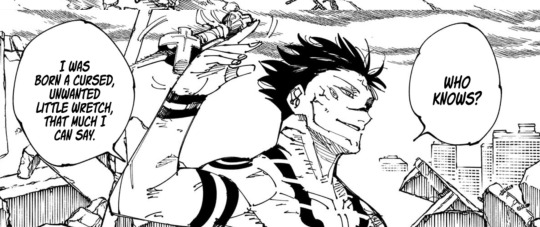

Disclaimer: These are just my thoughts using this specific translation. However Sukuna is a complex character and nothing is black and white and I’m probably heavily cherry picking here or reading way too much into this more than I should or would be necessary. 😆 WELL
Somehow it struck to me that one of the FEW things we know about Sukuna, is that he never married or bore any children. This is even more interesting, considering the fact that in the JJK verse, we do have a few absent wifes/lovers to name, that we know little to nothing about. Be it Megumi‘s mother, Kaori or a nonexistent wife of Sukuna. People often claim that Sukuna is a virgin, cause he didn’t marry or had kids. This is a whole other discussion, but this claim kept lingering in my head and made me think about marriage in the first place. Marriage and children often being a wholesome concept of love in our modern understanding, I first thought the marriage thing to be in connection to his claim to love being useless, that he not even once had interest in love. I think there‘s more to that.
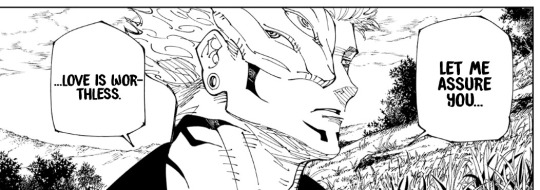
(although I do think that someone who claims that love is worthless kinda sounds heartbroken, but yeah anyway)
But then I thought „wait we’re speaking ancient times, did love play any role in marriage anyway?“
We still don‘t know the social status in which Sukuna was born in, but in regards to heian era, marriage was first and foremost a thing to secure and show social status. Marriages out of love weren‘t common, even seen as unrealistic.


Marriages were mostly arranged, often when they were still teenagers even. And this is what caught my attention. Sukuna says he was born a cursed unwanted little wretch and I first assumed this claim purely focuses on his parents and his early childhood.

But given the social norms in heian era, what if it also meant that he was literally unable to marry later on, that he wasn’t just unwanted by his by his parents, but by a possible spouse as well? Him saying he was “cursed and unwanted” indicates that it was a state he was put in, not a state he sought out to be. You could even argue, that him saying he was “unwanted” or “hated” even required him not wanting to be treated that way. Which child would want that? Which makes it even more interesting that he says, that he never thought about needing someone else to fulfill him. In connection to what I said before, it could almost sound hateful. As well as this moment here, which always occurred to me as if he said it from own experience.

Because when you grow up in a surrounding that hates & repels you, it makes sense that you grow indifferent to society, but it doesn’t necessarily mean it was always that way. Him being unwanted makes so much sense in connection with him saying, that he focuses solely on himself and that he has complete disregard to others. Which makes sense, when it’s a result of not having anybody who wants or loves you. It leaves you with yourself and yourself only.
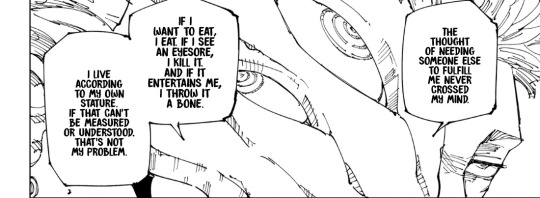
I know a lot of you really wanna fight the thought of Sukuna having a hard childhood but who cares honestly? I don‘t think it would make him less of a strong character. Every human is the result of their surroundings and as stated, Sukuna is human too. Based on that, you could even argue that the only kind of love he knows and sees as the real love, was an aggressive one. This would explain why he sees the slaughter of those who fought Kashimo as love.
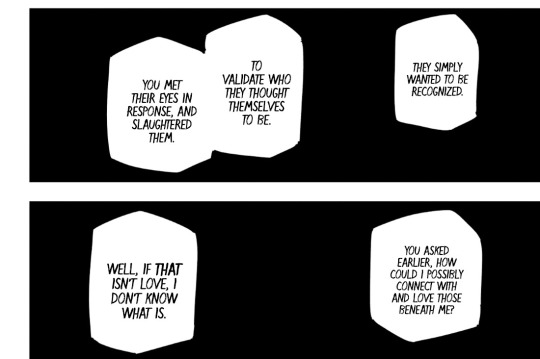
Ok back to marriage! When I read about marriage, there was another thing that caught my attention and that was poetry! We know Sukuna is a little nerd, who is eager to learn and it’s indicated that he even enjoyed poetry. (His immediate reaction to Yorozu‘s Haiku being that it lacks the seasonal word.) Back then, when someone was about to apply for marriage, what did they do? Yeah right, they wrote letters to someone.
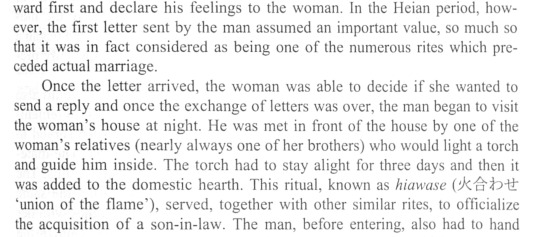
As I stated above, you could assume that there was a time, where Sukuna was not utterly hateful and indifferent to social contacts (I know that’s a reach, but that’s up for interpretation as long as we don’t know his backstory.)
If we assume, that Sukuna was born looking the way he looks, then it wouldn’t surprise me if there was a lot of rejection involved in the way the proposal was practised as described above. I don‘t wanna paint Sukuna as the poor rejected here, but idk maybe he was.
We all eagerly await Sukuna‘s backstory and I‘m so excited to learn about him. This suddenly turned into an analysis of Sukuna and his view on love and whatnot, but please remember, I’m not saying that any of this might have actually happened.
It’s just some connections my brain made while reading about marriage and thinking about some of the stuff that Sukuna said. I just had to write it down.
Here‘s the source: click
182 notes
·
View notes
Text
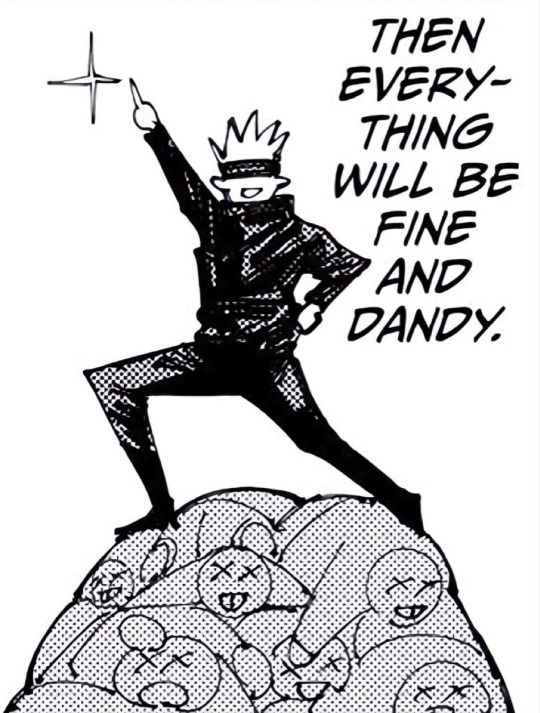
Everything was in fact, NOT fine and dandy after the shibuya nation stricked
241 notes
·
View notes
Text

"satoru, please let me drink in peace, i beg you"
#fanart#digital art#jjk#jujutsu kaisen#jjk 237#jjk236#gojo satoru#jjk gojo#jjk nanami#gojo#nanami#nanami kento#jjk fan art
6K notes
·
View notes
Text
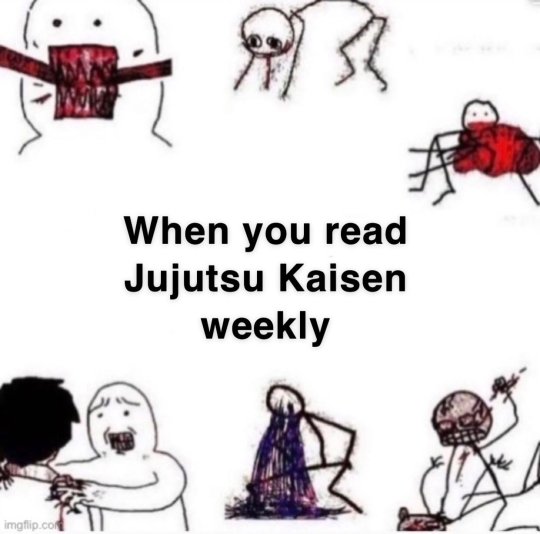
#jujutsu kaisen#jjk#jjk 237#jjk 236#gojo satoru#megumi fushiguro#jjk manga spoilers#jjk manga#jjk gojo#jjk megumi#jjk spoilers#jjk leaks#400
509 notes
·
View notes
Text
Gojo Satoru, who was loved since the moment he was born, surrounded by good energy VS Sukuna, who was hated since his birth and surrounded by cursed energy
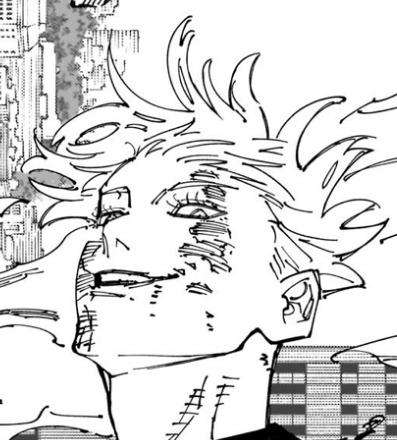
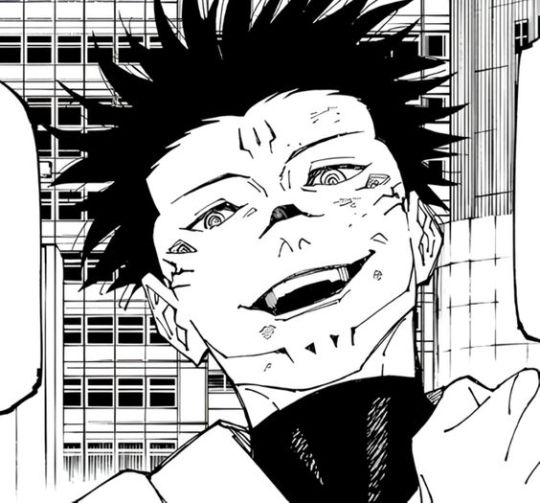
We are not sure yet, but imagine Sukuna was born the way he is now: 4 eyes, 4 arms, with tattoos even. Unlike Satoru who was born with pure white hair and lashes, blessed with Six Eyes.
The fact this two are opposites but the same drives me crazy.
#gojo satoru#satoru gojo#gojo#satoru#sukuna#ryomen sukuna#sukuna ryomen#jjk#jujutsu kaisen#jjk 237#jujutsu kaisen 237#sukugo
230 notes
·
View notes
Text
At this point I will accept any theories that say gojo is not dead
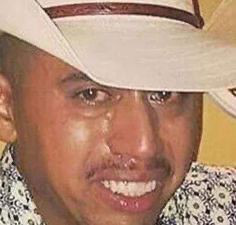
#maybe it was a clone#let me be delusional#Gege you can’t do this to me#gege could have stabbed me in the heart it would have been the same thing#Gege its on sight#obviously i will still read the manga but damn not gojo 😭😭#jjk 236#jjk leaks#jjk spoilers#gojover#gojo satoru#gojo vs sukuna#jjk#jujutsu kaisen#jjk 237#manga leaks#jjk manga#gege akutami
347 notes
·
View notes
Text
why are we getting an answer to that “are u strong, or are strong u?” question from sukuna when we’ve waited fucking hundreds of chapters for a pinch of introspection from gojo?? now he’s not even alive to answer? ok.
259 notes
·
View notes
Text

MEGUMI WILL LIVE
Sukuna reverting to his Heian era form sent the fandom into a panic because everyone assumed that Sukuna fully reverting back meant Megumi is now permanently dead. It doesn't. I understand how the fans would be worried because of how unceremoniously Gojo was just offed, but remember even Gojo got a long fight beforehand only the finishing blow was offscreened. He's still in Megumi's body though, all he did was change the shape of Megumi's body to look like his heian era self. It's the same way that Choso transfigured his host body when he was inserted inside of it, or other members of the culling games like Hajime did. The original owner of the body is still alive, because if the owner dies then Sukuna would still die along with him.
However, not only is Megumi not dead currently he's not going to die and the rest of this post will be explaining why.
Angel explains in chapter 199, that the reincarnated players are cursed objects swallowed by bodies who then use the bodies as vessels, reshaping them and then suppressing the body's original owner. It's the same for Megumi, Megumi at the finger and became a vessel for Sukuna, but instead of transforming all the way Sukuna stopped the transformation halfway through - until now. However, even in that case Megumi's soul is still there just suppressed.
Angel: My objective is to wipe out all players who've recinarnated. Most of them do it by suppressing the vessel's original owner... whether internally or subconsciously. And that's against God's laws... so it's wrong.
Megumi: God?
Angel: That's just a name I give to my beliefs. Pay it no mind.
Angel: So I decided to live in symbiosis with Hana.
Megumi: Can your technique revert possessed players to their original state?
Angel: It's not impossible, but it's extremely likely they will die... because the cursed object and body fuse. SO it's difficult to strip away one.
Yuji: That's why Sukuna dies if I die.
Sukuna hasn't completely killed Megumi, he's just suppressed the host consciousness, that was essentially the entire purpose of both the bath, and then killing Tsumiki immediately afterwards to bury Megumi so deep he won't fight back.
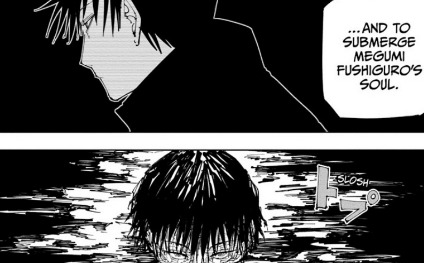
However, as I said that's just the technical explanation. I'm going to make a thematic argument about why if only one character of the four main characters survives until the end of the manga like Gege predicted, it will be Megumi. Before I begin though this is just a theory, I'm not saying Yuji or Nobara deserves to die so if you're a fan of them please be chill. Megumi will live and here's why...
Megumi's character arc is about birth rather than death. Megumi is a child, the end goal of his character death is not for him to die and be at peace with his death like Gojo and in my prediction Yuji, but rather for him to grow from childhood into adulthood. Everything in his character revolves around this concept, even his name.

Megumi, named blessing by his father. A child who is blessed in many ways, born with a technique that would have given Toji acceptance in the Zen'in if he had it, born a prodigy that got the attention of Gojo Satoru, and not blessed in other ways, no father, no mother, no adult in his life to guide him and forced to become a sorcerer or starve from an early age. However, more than that the name represents Toji's desire for Megumi to have a better life than he did.
Toji: Take care of Megumi, okay? That place is ueslss for someone like me, but for him...for someone with potential...it'll be a little better.
Toji: I don't care... I don't care anymore.
Toji: Hey, what's your name?
Megumi: Fushiguro.
Toji: Not Zen'in, huh?
Toji: Good for you.
I have said before that Jujutsu Kaisen is a tragedy, but tragedies aren't really hopeless stories where everyone dies and nothing good ever happens. Even while Gojo's death is tragic, his dying dream is bittersweet as he reflects on the fact he made great friends in life and protected a lot of people. Which is why I don't think Megumi's name is supposed to be ironic, he was named blessing because he's supposed to be where the chain of abuse that started with the Zen'in -> Toji and carried on -> Megumi finally ends by breaking that cycle.
Megumi is a child, episode 5 of Juju Stroll "had Megumi describe Panda's smell as "ohisama" (お日様) which is a super childish way of saying "sunshine". It kind of literally translates to Mr. Sun, and it's such a cutesy way of talking that the girls get flustered. It's also mentioned in one of the audio dramas where they go out to eat beefsteak that Megumi only wants to eat the sauce and Yuuji reacts by basically saying "Are you a kid??" He also dislikes red peppers."
These childish affectations are there to show us Megumi is not what he appears. That's also basically the twist with his personality too, because he has an incredibly serious personality, and is considered a jujutsu prodigy most people mistake him for being mature for his age when he's really just repressing his emotions all the time.
Fushiguro had intended to just pay and leave but with his serious personality, his idea of leaving was dismissed by Itadori’s reasoning.
However, his eyes that were as deep as the night that peeped out from the bottom of a deep ditch became even more lifeless.
Fushiguro tried once more to switch off his self-awareness.
Numbness was the safety feature of life. If he did not think of a way to protect his spirit, it would not be strange if a curse was born.
Megumi is putting on airs of being an adult, but I'd argue he's the most childish of the main three, because at least Nobara and Yuji both had parental figures and normal childhoods until high school. Megumi was handpicked to be a sorcerer at age six and received no adult guidance outside of that, just training to be a sorcerer. Megumi is a child forced into sorcery at a young age in order to pay his bills and survive, in the manga where the central goal of one of the main characters is that children should be able to live out their youths. If Megumi dies before he's even able to grow up, that goal will be unaccomplished.
Ijichi: Then Itdori will have to go into hiding for good.
Gojo: Nah, I'll have him ready in time for the goodwill event.
Shoko: Why?
Goo: Easy. I refuse to keep this kid from living the best years of his life. Not just him, but everyone.
Of course that argument works for Yuji and Nobara as well. They're also children who I am predicting will die tragically early, wouldn't that go against the themes of the manga too? My argument is this, we've already seen kids die young, Mai Zen'in, Kokichi Muta, Junpei Yoshino, because Jujutsu Kaisen is a tragedy. However, there will be a few characters who survive into adulthood and live to see a better world where losses like the above characters don't happen anymore. Those characters however, are characters where their character arcs revolve around them living.
Yuji's character arc is a contemplation of death and searching for a proper death (I'll talk more on the differences later) Nobara's is more tricky without talking about the quality of the writing, but let's say Nobara's death shows that even a "main character" isn't exempt for death. Which is appropriate as Nobara thinks of herself as the main character of a story. Megumi's character arc however is specifically about a cycle of abuse that started with his father, and continued to him. Unlike Nobara and Yuji who were outsiders who made the choice one way or another (traveling to Tokyo, or swallowing the finger) to enter into the world of sorcery, Megumi was born into this situation and his choice was become a sorcerer when he was a teenager or starve. Gojo had the chance to break the cycle of abuse with Megumi and he didn't, because he saw another potential strong sorcerer.
Toji: But then the unexpected happened 11 years ago, when Toji Zen'in appeared. he was physically gifted through heavenly restriction and on top of that he was an anomaly who had escaped from cursed energy. As a human being who had escaped fate through the power of restriction... he destroyed our destinies.
Jujutsu Kaisen is a story about cycles, and not only is the narrative goal set by Gojo to 'reset this crappy Jujutsu World" so that the cycle of abuse adults heap on children will be broken by the end of the story, but Toji himself is referred to as the breaker of chains and Megumi is Toji's son. Megumi, who he named blessing. The inciting incident of the story happened, because the Zen'in abused Toji to the point he became a remorseless murderer and killed Riko in front of Geto's eyes, starting the domino effect that led to today's plot. Megumi is at the center of that, he is in a way the central victim of the story in a way Yuji is not because even Yuji got the choice to eat the finger or not. Eating the finger, and being executed to destroy Sukuna are burdens Yuji willingly took on whereas Megumi was possessed forcibly by Sukuna creating the current situation. Yuji also wanted to be a sorcerer and wanted to get stronger as one when sitting in his room and waiting to have the fingers delivered to him was a possible option, whereas for Megumi the choice was to be a sorcerer or starve.
Jujutsu Society will not have changed from Toji's generation, or even Gojo's generation if Megumi the child does not survive to adulthood like his father.
Megumi is someone with very little agency or sense of control over his own life, just like a child too he is at every turn practically helpless to the forces of the adults in his life. Of course he's a character who makes choices, but he's still making those choices in the framework of a world of adults who have authority over him. Megumi doesn't get to retire at being a sorcerer or he'll starve, so the choice he makes is "I'll selectively choose who I save as a sorcerer" which is a comrpomise he makes.
He doesn't have a choice but to be a sorcerer, so he chooses to be a sorcerer for selfish reasons. He's also someone with little care for the institution of sorcery. Even his choice to be a sorcerer with the Zen'in, or to be a sorcerer with Gojo is made on the axis of "What will give Tsumiki a better life?" The same with his choice to save Yuji from execution, he doesn't care what is right or wrong by sorcerer society standards, just that he personally wishes to see Yuji saved. Afterwards when Yuji expresses remorse for Sukuna's mass murder in Shibuya, Megumi is pretty unbothered by the moral ramifications of it.
"We aren't heroes fighting for justice. No one can ever truly judge us, so we must continually prove the worth of our existence. and we don't have the luxury of thinking of ourselves. We've just got to save people. I believe that was the original principle behind your actions. So start by saving me!"
Those words aren't just foreshadowing for what Yuji's final task in the manga is (Hint hint, Yuji now needs to save Megumi from Sukuna's possession otherwise Sukuna will continue to rampage in his body).
It's also illustrative of Megumi's character, he's not someone who makes moral judgements at all, not really. He has no concept of moraity, justice, because those are adult ideas and he is a child trying to survive in the world of adults with what limited power he has. Megumi does make choices as I said he chooses to forgive Yuji for mass slaughter in Shibuya, during the Culling games he chooses to make saving Tsumiki a priority above everything else even innocent people inside the games (something only Yuta is shown actually doing) which is consistent with the choices Megumi has always made. Megumi has no choice to be a sorcerer, so he chooses to use his power selfishly to protect one or two loved ones (and his comrades sometimes) instead of using them for altruistic reasons like Yuji or utilitarian reasons like Gojo.
Megumi doesn't have morals, because he's not in a stage of development where he can actually think and develop morals. This is a thing in psychology, Jean Piaget was the first psychologist to study ways in which children processed the world different from adults. He identified stages of moral development believeing it correlated with stages of cognitive deveolpment (congition = understanding) which Kohlberg then defined into roughly six stages of development.
Stage 1. Obedience and Punishment. Child is good to avoid being punishment.
Stage 2. Individualism and Exchange: At this stage, children recognize that there is no just one right view handed down by the authorities, different individuals have different viewpoints.
Stage 3. Good Interpersonal Relationships The child / individual is good to be see as being a good person by others. THerefore, answers relate to the approval of others.
Stage 4. Law and Order Morality. The child becomes aware of wider rules of society, so judgments concern obeying rules to uphold the law and avoid guilt.
Stage 5. Social Contract and Individual Rights. The child becomes aware that laws exist for good, there are times they work against interest of individuals.
Stage 6. Universal Principles. Pepople at this stage have developed their own set of moral guidelines they apply to everyone.
Megumi is trapped at Stage 3, his only concern is how his actions will affect his interprersonal relationships with others. Everything he does is in regards to maintaing those interpersonal relationships, and he casually just disregards outside morality all the time. Even Kurusu who bonded with Angel and entered the culling games because of one kind deed Megumi did for her in the past shares this same reasoning, she does good deeds because she wants to be approved of by the person she likes.
Hana: Fate is all. I believed we would someday meet again. So little by little, in hopes of being worthy to stand by your side... I help people.
Megumi's morality is-selfcentered yes, but he hasn't developed into a mature enough person to be able to think of the points of view of other people. Even when Megumi does attempt to assert some control in the world an adult appears and steals control from him, literally in fact when we learn that his attempts to save Tsumiki were pointless to begin with, because Tsumiki is possessed by Yorozu. Shortly after this revelation Megumi permanently loses control, because his bodily autonomy and basic ability to make choices is stolen from him by an adult. Megumi's life is defined by how little control he has in it, he says it in what is his first inner monologue.
Megumi: The only thing that is fair about life is how unfair it is to everyone. She was the kindest person, there was no reason to think otherwise, she was someone who deserved to be happy, but Tsumiki was cursed. My father who didn't even know my gender gave me the name Megumi. He's still alive somewhere. Karma doesn't happen on its own. Criminals are disciplined under the law. Jujutsu sorcerers are only a cog in this retribution. If only more good people could receive fairness. I'll save people whether or not it's fair!
That entire monologue but especially the first sentence is true to Megumi and his life so far, the only thing fair about life is how unfair it is to everyone. Everything is chaos, especially the world of adults, something Megumi has not been sheltered from at all. Megumi's name was blessing, but his father who was responsible for taking care of him just ran off somewhere else and left him to the wolves.
You could even draw some kind of sick parallel to the king of curses himself, who refers to himself as an unwanted child. I don't know if we're going to get a sob story for Sukuna, but if the greatest curse in history was created because he was thrown to the wolves as a child, then that says a lot about sorcerer society. Megumi is just more aware of the dog-eat-dog nature of Jujutsu Society then the rest of the characters, it's why he's constantly trying to tell Yuji that sorcerers arent' heroes. It reminds me of two quotes from Buffy the Vamprie Slayer from Faith, another homeless teen exposed to the world's violence at a really young age with no adults to sheperd her.
Joyce Summers: You don't know the first thing about Buffy... or m
Faith: Don't I? I know what it's like. You think you matter. You think you're a part of something, and you get dumped. It's like the whole world is moving, but you're stuck. Like those animals in the tar pits. It's like you just keep sinking a little deeper every day, and nobody even sees!
[...]
Buffy: I gave you every chance. I tried so hard to help you, and you spat on me. My life was just something for you to play with. Angel - Riley- anything that you could take from me you took. I've lost battles before - but nobody else has ever made me a victim.
Faith: And you can't stand that. You're all about control. You have no idea what it's like on the other side! Where nothing's in control, nothing makes sense! There is just pain and hate and nothing you do means anything. You can't even..."
Megumi's life is defined by this learned helplessness, he's not someone who at seventeen believed he had the complete freedom to do whatever he wanted like Gojo, he's trapped in the tar pits sinking a little deeper every day. There's a reason his Jujutsu Technique is shadows, which turn into muddy water when he uses his domain expansion, and why Sukuna bathed in black water to sink Megumi down to the bottom of his consciousness so he'd stop fighting back.
Megumi's someone with power, but with no real agency in how he uses it, as someone who avoids making choices, and asserting himself over ad over again. Unlike Sukuna and Gojo characters with overwhelming senses of self who seem to have complete freedom to choose, Megumi entirely lacks a sense of self, and therefore doesn't make his own choices.
Gojo: You sacrificed yourself so that Nobara could advance. Well, good for you. But people like Yuji and I... are always swinging for the fences. I'm not saying a sacrifice bunt is bad. Baseball si a team sport in which each member is expected to play their role. However, being a Jujtusu Sorcerer is an individual sport.
Megumi: But isn't coordinating with other sorcerers important?
Gojo: Yes, but no matter how many allies you have around you... you'll always die alone. Right now, you can only judge and match those around you instead of picturing a stronger future you. Maybe it's because of that ace in the sleeve you think in a worst case scenario if you were to at least sacrifice yourself all would end well. Keep that up and you can forget about becoming as strong as me, you won't even match up to Nanami. To die and then win, and dying victoriously are two completely different things, Megumi. Give it your all. It's okay to be selfish!
Megumi's narrative challenge goes beyond learning that it's okay to be selfish sometimes though, he's tasked with learning to cultivate a sense of self where he has none previously. You se Megumi is the most Jungian of Jung characters in the Jung manga, his power is literally the treasures he keeps hidden in his shadow. He's someone who continually fails to live up to his potential. He has no looked in his shadow at all whatsoever and therefore he's completly stunted in his development. His goal is to develop the ten shadows figuratively, but literally it's too cultivate a sense of self and reach adulthood as a fully grown individual and not the helpless child he is currently. He even is the first ten shadows user to develop a domain expansion, a domain expansion is a sorcerer using their innate domain (personal inner world) onto the outer world.

Megumi's endpoint is individuation (the process through which a person achieves a sense of individuality separate from the idenities of others and begins to consciously exist as a human in the world.)
As Jung Stated:
The aim of individuation is nothing less than to divest the self of the false wrappings of the persona, on the one hand and the suggestive power of primordial images on the other.
Jung's two theories on selfhood was divided between persona (what we are for other people) and the shadow (what we suppress about ourselves subconscious images we are controlled by). Here we have Megumi, someone who puts on the persona of being a mature, serious individual to survive in the world of adults, and also has the ten shadows which are representative of the suppressed undercurrents of violence but also his self-sabotage that Gojo identifies, suppressed emotions he is unconsciously controlled by. Both of these identities are Megumi and neither of them are.
Megumi's not a fully realized individual because he doesn't have a balanced sense of self at all, or even any sense of self because his two sides are all out of whack. In Jungian terminology the shadow is made up of primordial images shared by all of society, and what is more primordial then being literally possessed by a curse that's a character based off of a folk legend of ryomen sukuna in the real world.
Integration of the shadow is necessary for the process of individuation, Jung even names a confrontation with the shadow as a prerequisite for moral growth.
“The shadow is a moral problem that challenges the whole ego-personality, for no one can become conscious of the shadow without considerable moral effort. To become conscious of it involves recognizing the dark aspects of the personality as present and real. This act is the essential condition for any kind of self-knowledge.”
Once again connecting back to Kohlberg's terms of moral development loosely, children see morals in terms of just outside consequences being applied to them. A child thinks "I can't steal this cookie because the adult who is the enforcer of morals told me it's wrong and will punish me." The final step of moral development is to create your own morals which apply to the world around you. Jung calls the shadow a moral problem because you have to become conscious that you yourself are capable of being wrong in order to properly render judgement on yourself. You can't judge yourself, or reflect on yourself, if you don't look at yourself properly, or ignore half of what you are because you don't want to see the bad in you.
The encoutner with theshadow and the confrontation with the beast is the first step of individuation, and what is Ryomen Sukuna if not one big shadow representing all the evils and selfishness of mankind. A cruel reflection of both Megumi, but also Gojo and Toji. Megumi, Sukuna says, this is how Gojo and Toji lived. They lived fighting from others and simply taking what they wanted, and no one could take from them.
It's extra ironic that Megumi is a blessing, and Sukuna refers to himself as an unwanted child.
Translation by @kaibutsushidousha
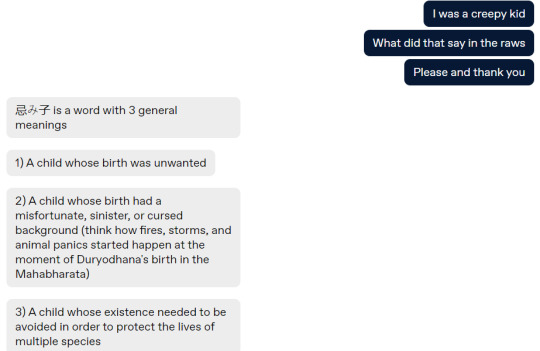
Sukuna is clearly a result of climbing to the top of the food chain after being thrown to the wolves, something which Megumi could become if he learned to wield his power that way and something arguably Gojo tried to push him towards (at least in the sense that Gojo wants to craft Megumi into a successor, into another Gojo). Megumi isn't nearly on Sukuna's level, but Megumi could become Sukuna, someone who only ever wields their power for themselves and only cares about being the strongest. That kind of person would never experience loss and discomfort the way Megumi did when he helplessly watched Tsumiki die. Sukuna is funcitoning as a beast for Megumi to compare himself to, even making Megumi himself feel guilty by getting Tsumiki's blood on his hands via killing her with his technique.
Kenjaku: What's the point of soaking in it?
Ura Ume: To be near evil, and to submerge Megumi Fushiguro's soul.
Megumi has to confront Sukuna to learn that he is not like Sukuna. The other option is remaining helpless inside of Sukuna and just letting Sukuna completely have control. Regaining control of his body, and also discovering himself are essentially the same thing in this situation. Jung says that people who are unaware of their shadow, will be controlled by it, or at lest they won't realize that they're the ones messing up when things go wrong and will always attribute it to outside situations like fate instead of realizing they do have control and choices to make.
“The psychological rule says that when an inner situation is not made conscious, it happens outside as fate. That is to say, when the individual remains undivided and does not become conscious of his inner opposite, the world must perforce act out the conflict and be torn into opposing halves.” (Carl Jung)
To briefly reference another manga.
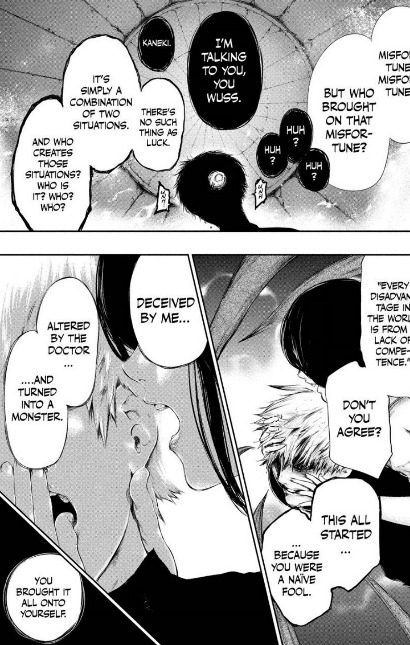
For Megumi regaining control over his body and assserting himself would also mean accepting that he's the one making choices here, he's the one to blame when things go wrong, and he's responsible. I argued over and over again that Megumi is effectively helpless yes, but that's because he's symbolically a child in order to grow into an adult he would have to learn to take responsibility for his actions like an adult would.
Such a process would also involve having to admit to some degree culpability and fault to his own actions. To become a person living in the world and therefore capable of making mistakes, rather than a dead dinosaur sinking in the tar pits.
“If you imagine someone who is brave enough to withdraw all his projections, then you get an individual who is conscious of a pretty thick shadow. Such a man has saddled himself with new problems and conflicts. He has become a serious problem to himself, as he is now unable to say that they do this or that, they are wrong, and they must be fought against… Such a man knows that whatever is wrong in the world is in himself, and if he only learns to deal with his own shadow he has done something real for the world. He has succeeded in shouldering at least an infinitesimal part of the gigantic, unsolved social problems of our day.”
— Carl Jung, Psychology and Religion (1938)
Megumi is obviously not even remotely close to there, not only is he blinded by shadows, but he's been referred to as a fool before this.
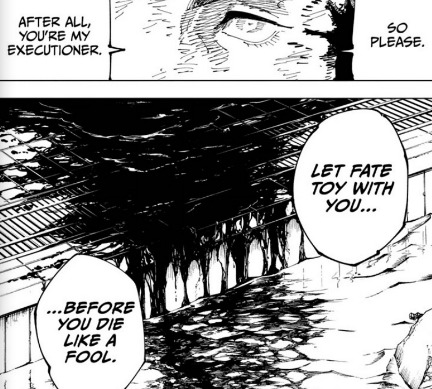
Let fate toy with you, before you die like a fool a prophecy which has been hanging over Megumi's head since the Reggie fight. You could take this as foreshadowing for Megumi's death, but honestly that's only if you're interpreting it in the most literal way possible.
Number one, what is fate in Jujutsu Kaisen?
Characters talk about it, but there's no canonical concept of fate. When Megumi asks Angel what God is, Angel says that you can just refer to God as a set of beliefs they have. In a Jungian reading, Fate is just what we attribute to things we think are out of our control but really aren't. It's not fate toying with Megumi, it's outside factors, and Megumi's own perceived lack of agency in his decision making.
Number two, what is death in Jujutsu Kaisen?
Remember this is the most Jung of the Jung manga, and when I hear die like a fool I think Tarot.
The Fool's Journey is a metaphor for the journey through life. Each major arcana card stands for a stage on that journey - an experience that a person must incorporate to realize his wholeness.
In Tarot a set of 22 major arcana are used as stages in a metaphorical journey where an individual starts out as a newborn, a nobody, and becomes a fully realized individual through a series of stages and trials that prompt self reflection. Megumi would be in this manga the archetypical fool on the fool's journey, because as I said of the four main characters he's the one with the least sense of self and the most helpless. Megumi does not make choices, Megumi is pulled along by the nose.
We begin with the Fool (0), a card of beginnings. The Fool stands for each of us as we begin our journey of life. He is a fool because only a simple soul has the innocent faith to undertake such a journey with all its hazards and pain.
At the start of his trip, the Fool is a newborn - fresh, open and spontaneous. The figure on Card 0 has his arms flung wide, and his head held high. He is ready to embrace whatever comes his way, but he is also oblivious to the cliff edge he is about to cross. The Fool is unaware of the hardships he will face as he ventures out to learn the lessons of the world.
The Fool stands somewhat outside the rest of the major arcana. Zero is an unusual number. It rests in the exact middle of the number system - poised between the positive and negative. At birth, the Fool is set in the middle of his own individual universe. He is strangely empty (as is zero), but imbued with a desire to go forth and learn. This undertaking would seem to be folly, but is it?
The fool is in the center of his own individual universe, and is also strangely empty, a zero. A person who I'd argue like Megumi has no identity, and has to journey out into the world in order to find one. Once again, I'm arguing Yuji had a normal life for seventeenish years even if he's Kenjaku's science fair project, Nobara was raised in a small village, Megumi is the only person who was born within the small secular world of sorcerers and never experienced anything else (who is also one of the main four characters) and unlike Gojo is helpless and not the strongest dude in existence.
Death is a stage of the fool's journey, it's not the end or even a literal death but a transformation. The fool's journey argues that a symbolic death has to happen of the old self in orderto make room for a new one. Which is true for a lot of things of life, in order to grow into an adult you have to stop being a child. Entering the next stage of life requires leaving behind the last one.
DEATH:
The Fool now begins to eliminate old habits and tired approaches. He cuts out nonessentials because he appreciates the basics of life. He goes through endings as he puts the outgrown aspects of his life behind him. He process may seem like dying because it is the death (13) of his familiar self to allow for the growth of a new one. At times this inexorable change seems to be crushing the Fool, but eventually he rises up to discover that death is not a permanent state. It is simply a transition to a new, more fulfilling way of life.
The next stage after death is the temperance, which has you know... an Angel, which there's totally not one of those in Jujutsu Kaisen. While I wouldn't say that JJK is a manga that strictly follows the fool's journey like say Tokyo Ghoul does where you can map out stages of the story to different major arcana, "let fate toy with you before you die like a fool" I think isn't a stretch to connect to the idea of death and what it means to the fool's journey.
Megumi arguably also has to let things die in order to progress as a person. Tsumiki is more or less dead by the beginning of the story. We never see her on her own terms just Megumi's memories and you can't be alive in a memory, there was never any chance of resucing her because we knew she was possessed by Yorozu we were just led into believing she might have been one of the people who awakened a curse technique instead. Megumi in a way as cruel as this sounds needed to let Tsumiki die, because there was nothing he could have done to help her, and he hasn't allowed himself to grieve or mourn her or move past her in any way. His entire identity is built around protecting his princess, but his princess isn't in another castle, she's dead. He needs to find a new identity, a new reason of living, and that can't be Tsumiki or even Yuji because Yuji is just a repeat of Tsumiki even in the sense that both of them are doomed by the narrative.
Megumi needs to let his sister die and mourn her, and that also requires being alive to mourn her when this is all over.
Sukuna: The destruction of Tsumiki Fushiguro will allow me to completely bury Megumi Fushiguro.
Sukuna argues that the death of Tsumiki will be the death of Megumi, but in reality that's just the death of who Megumi used to be. The person who defined himself entirely as being Tsumiki's protector and existing for the sake of her happiness is gone along with Tsumiki, but there's still a chance he could start from scratch. This is what Sukuna compeltely fails to take into account, but then again Sukuna doesn't even understand why people who are weaker than him bother struggling to live in the first place.
Sukuna: Well, allow me to ask. Why are you so weak? You're weak, yet you cling to life. Cotinuing on your path means destruction, yet you wish to be happy as long as possible. You should spend your lives stifling your misery/
Yuji: You should be the one trying to stifle this misery!
Suuna: Come coloser. (Hm? Why is he so tough? No, that's not right! It's my cursed energy output that's low!) Damn you, Megumi Fushiguro.
Immediately after seeing this speech about how weak people should stop resisting him because it's futile, watching Yuji continue to resist him sparks inspiration for Megumi to fgiht back from within. All of this showing evidence that Megumi is not doomed, he himself can still move on to form a new identity after this "death" he's experienced of his old ones. In fact it's probably going to be what beats Sukuna, because this is Sukuna's blindspot he doesn't think weak people are capable of resisting him in any way.
Strong and weak are separate categories in his mind, he doesn't think people can grow. But you know, Megumi's whole narrative challenge is to grow up.
Why Megumi, why not Yuji?
Megumi and Yuji are close character foils and a lot of things I said for Megumi could be said for Yuji as well, but I am pretty firm in saying Megumi's going to live instead of either Yuji living, or them both living. As I said this is because of what I think the difference in Yuji and Megumi's arcs are, Megumi is the child that's supposed to grow up that's his backstory, that's what he is symbolically, the child neglected and failed by every adult who came into his life (Toji, Gojo) and by sorcerer society as a whole.
Megumi's goal is individuation, to grow into a fully developed individual, an adult. It would be too tragic even for this manga to have Megumi be neglected and abandoned all his life and then to die like a fool.
Well, wouldn't it be tragic for Yuji, too?
Yes, but Yuji's narrative has been setting us up for that tragedy since the first chapter.
Tragedies aren't just stories where sad things happen, it's a pretty rigidly defined narrative structure. A tragedy just like any story is about set up and pay off. You set up certain ideas early on in the narrative, you prepare your audience for an ending and you deliver on that ending, any last minute flips, twists, unless those are properly set up too are going to be seen as narratively unsatisfying.
Tragedies don't happen because rocks fall and everyone dies. Tragedies in the modern sense happen because of the choices of the characters made over the course of the story, in other words you reap what you sew.
Unlike Megumi's narrative arc which has been setting us up for him to grow up, Yuji's has been setting up the opposite since day one.
Grandpa Itadori: Yuji, you're a strong kid, so help people. It doesn't ahve to be all the time just whenever you can. You may feel lost. Don't expect gratitude. Just help them. When it's your time to go, make sure you're surrounded by others. Don't end up like me.
Yuji's narrative challenge, a literal dying curse given to him by his grandfather is for him to help people in his life so he'll die being surrounded by friends instead of dying alone. Everything Yuji does after that, and swallowing the finger in the first chapter, is contemplating the kind of death he thinks is a "Good/Natural Death" and the kind of ugly and unsatisfying deaths that curses bring on their victims.
Yuji's reason initially for agreeing to be executed is that if he eats all 20 sukuna fingers, then he'll prevent a lot of the unnatural deaths in the world that would have been caused by curses being drawn to those fingers. He draws a line against the abrupt, gruesome, early deaths caused by curses and their victims and the kind of death his grandfather had where he at least had a natural death at the end of a long life.
Death... Well, I can somehow feel death from the school. I'm afraid of dying. I wonder if grndpa was scared of death. No, probably not. I cried because I was sad, not scared. The death I face now, and Grandpa's death... how are they different? You're a strong id, so help epople. He was short-tempered and stubborn. No one went to see him besides me. Don't end up like me, huh? I guess so, but... I think you died peacefully, grandpa. (Faces a curse spirit) This is not a natural death.
No matter who they are, Yuji wants to spare them from an unnatural death, because he on top of that doesn't think he has the right to make judgement calls on who lives and who dies. Yuji is constantly contemplating his own death and what it means from the narrative.
In the Cursed Womb arc, Yuji feels like he can faith his death only for him to become so terrified in the face of fighting a special grade cursed spirit that he loses the ability to keep Sukuna under his control and can't switch back with him after letting him go. Yuji realizes his resolve isnt' as strong as he thinks it is when actually facing death for the first time, but also how to channel those negative emotions into something because he pulls off his first divergent fist in the heat of the motion.
When encountering Junpei and Mahito, not only does Yuji elucidate Junpei on why he doesn't want to make judgement calls on who lives and who dies because even if he inevitably has to be a murderer one day he feels like if he does life will lose its values, he also is confronted with Mahito the antithesis of Yuji's beliefs. Mahito's way of killing is to mutilate humans so horribly they are begging for death, the unnatural death possible. He creates victims who Yuji cannot save and cannot bring a natural death, only be mercy killed, and he creates another one of Junpei right in front of Yuji just as he was on the brink of saving Junpei from his unnatural early death and sparing him instead of hunting him down and killing him as a curse user as he is supposed to.
In The Origin of Obeidence / Death Painting Arc not only does Yuji realize the two people he's killed are living beings who cried for their family members (also his brothers what a twist), but also he is told face to face by Sukuna that his action of eating the first cursed finger which he thought would make less curses appear in the world, actually caused the curse fingers to resonate and draw stronger curses to them. The action that he thought would save more people in the long term, has in fact, killed some people in the short term because of this resonance.
In the Shibuya arc, basically everything is thrown in Yuji's face, what was foreshadowed in the previous arc that eating the fingers with Sukuna might not save a bunch of people in the long term turns out to be true. Now no matter how many people he could save by offering himself to be executed after eating all 20 fingers, Yuji still has caused the massacre of thousands in Shibuya because of eating the finger.
In the aftermath Yuji is mindlessly killing curses as a cog, until at least Megumi shows up and begs for Yuji to "start by saving me..."
Yuji's arc is a self-reflection and contemplation on death, and his goal is to die on his own terms, but also to die surrounded by people unlike his grandpa who would die alone.
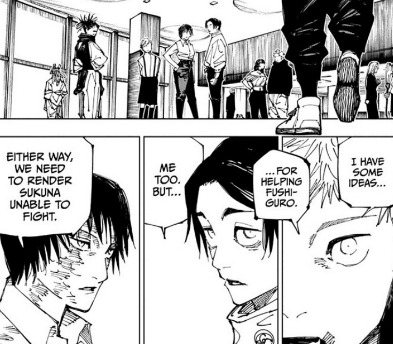
Now, Yuji is currently the only character who has any interest at all in saving Megumi as a first priority (everyone else constantly just talks about the need to put Sukuna down first).
Saving Megumi at the cost of his life, fulfills Yuji's two narrative goals, helping people, and also dying surrounded by others. He also would be rejecting the cog mindset, because Jujutsu Society would say kill Megumi for the greater good above all else, it's what everyone else in this situation is prioritizing first. It's also fulfilling Megumi's request to Yuji "start by saving me..."
Yuji's death is tragic yes, but it would end in a way that's satisfying to his narrative arc. Yuji gets to determine the way he wants to die, and he dies out of choice, not as an unthinking cog, and not alone. Gojo's death is tragic, but it's also satisfying to his narrative, he wanted to live to be the strongest and using his strength selfishly even accomplishing some selfless goals and protecting others for selfish reasons and he got to go out on his own terms.
Yuji is the cage that Kenjaku built to contain Sukuna, and Yuji can probably devise some way to take Sukuna back from Megumi so he can choose once again to die on his own terms, this time at least for the sake of saving a friend who he can die beside.
Megumi's death would be tragic, and also unsatisfying to his narrative, because he wouldn't get the chance to grow up. He's not dying according to his own choice here either, if he's killed alongside Sukuna then he's being mercy killed, or sacrificed for the greater good (the greater good). Megumi didn't choose to get possessed, and if he's killed here by Yuji, or Yuta, or Maki or whoever he's not choosing to die either, or even getting to die fighting like Gojo did.
Jujutsu Kaisen is a tragedy, but it's also one where we have been telegraphed by the narrator that the society will have changed by the end of the narrative. The central goal of the narrative is to allow these ids to grow up in a better world, and become fully realized adults and in order to do that a few of the kids actually have to survive to adulthood. I argue that Megumi will be the one to survive, because he's the most childish, and with the most growing to do. It will still be tragic in a way, Megumi who only lives for others, having to learn to live for himself is about as bittersweet as you can get. However, if Megumi's narrative goal is to learn to live without Tsumiki, without Yuji, then the only way for him to do that is well... to live. Even if it's lonely, or hard, Megumi needs to live on past the end of the manga.
#jjk meta#megumi fushiguro#gojo satoru#yuji itadori#jjk 237#jjk 237 spoilers#jujutsu kaisen 237#jujtusu kaisen 237 spoilers#jujtusu kaisen spoielrs#jujutsu kaisen#jjk spoilers#ryomen sukuna
305 notes
·
View notes
Text
I didn't really need to draw Yuji there, but I did. He's there to sit and look pretty 🙏 Amen.
(I completely forgot to add Gojo's dimples...ffuUU—)
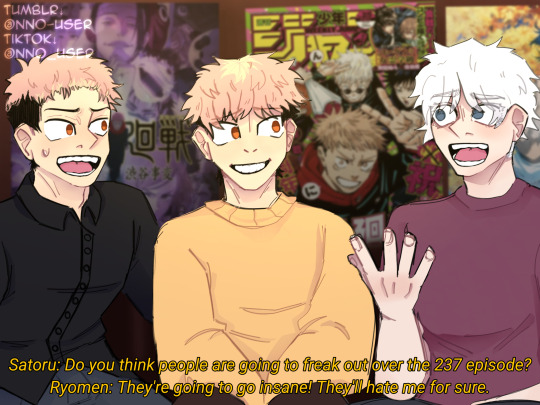
[ Ryomen Sukuna + Yuji Itadori + Satoru Gojo ]
#ryomen sukuna#yuji itadori#satoru gojo#jujutsu kaisen#jujutsu kaisen fanart#jjk#jjk fanart#jjk au#jjk 237#jjk manga spoilers#actor au#jjk actor au#artists on tumblr#🔍 ; no username // art tag#🔍 ; no username // au tag
234 notes
·
View notes